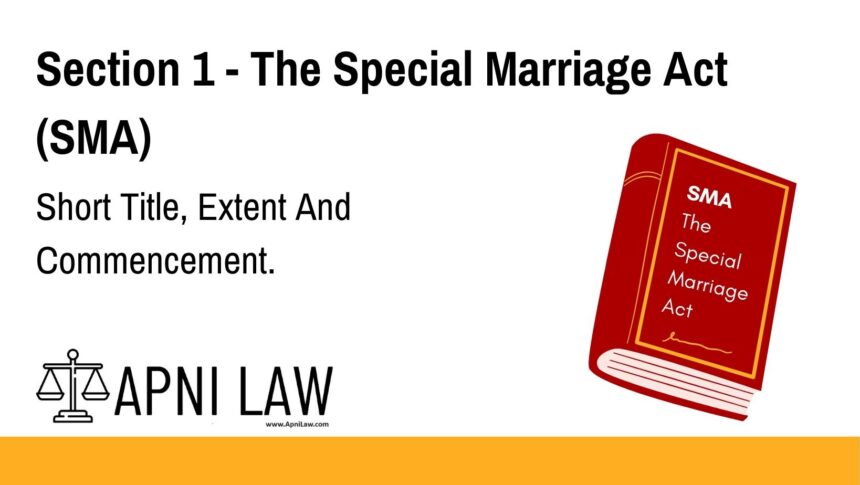Code: Section 1 of the Special Marriage Act, 1954
(1) This Act may be called the Special Marriage Act, 1954.
(2) It extends to the whole of India, and applies also to citizens of India domiciled in the territories to which this Act extends who are in the State of Jammu and Kashmir.
(3) It shall come into force on such date as the Central Government may, by notification in the Official Gazette, appoint.
Explanation of Section 1 of the Special Marriage Act
Section 1 of the Special Marriage Act, 1954 defines the Act’s name, its territorial reach, and its commencement. It is the foundational provision that establishes where and to whom the law applies.
Key Highlights
- Short Title: The legislation is officially cited as the “Special Marriage Act, 1954.”
- Extent: It applies across the entire country of India and also covers Indian citizens domiciled in Jammu and Kashmir.
- Commencement: The Act came into force on a date notified by the Central Government through publication in the Official Gazette.
Illustration
Example 1: Pan-India Applicability
A couple residing in Maharashtra, and another in Delhi, both want to marry under a secular legal framework. Both can do so under the Special Marriage Act, 1954, as it is applicable throughout India.
Example 2: Application to Citizens in Jammu & Kashmir
An Indian couple originally from Delhi but living in Jammu and Kashmir can solemnize their marriage under this Act since it applies to citizens domiciled in those territories.
Common Questions and Answers
1. What is the objective of Section 1 of the Special Marriage Act?
It establishes the name of the Act, where it applies, and when it came into effect.
2. Is the Special Marriage Act applicable to people of all religions?
Yes. The Act is a secular law that allows marriage without the need for religious conversion.
3. Does the abrogation of Article 370 affect this provision?
Section 1(2) already included applicability to citizens domiciled in Jammu and Kashmir. Post-abrogation, all central laws, including this one, apply fully to the Union Territories of Jammu & Kashmir and Ladakh.
4. When did the Act come into force?
The Act came into force on 1st January 1955, as notified by the Central Government in the Official Gazette.
Conclusion
Section 1 of the Special Marriage Act, 1954 sets the stage for a uniform civil marriage law applicable across India. Its emphasis on a secular framework for marriage has made it a crucial instrument in promoting equality and legal consistency, especially for interfaith and inter-caste couples.
For detailed legal resources and plain-language explanations, visit ApniLaw.








